Governor’s speech carries concerns for county governments
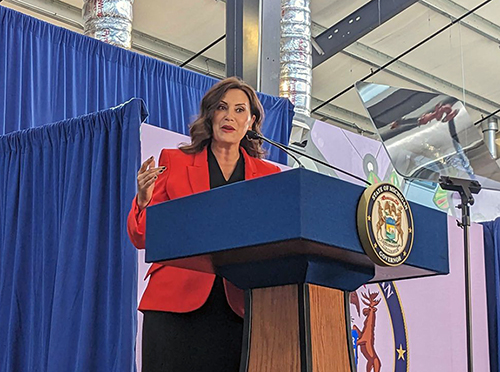
Gov. Gretchen Whitmer spoke in Lansing on Aug. 30, 2023, about her legislative priorities for the fall. (Photo: Bridge Magazine)
Gov. Gretchen Whitmer announced her fall legislative priorities that included a push for clean energy, streamlined permitting and increased election security in a speech on Wednesday. While the governor traditionally delivers a State of the State Address annually in January, her presentation this week felt very much like a second act to her 2023 address.
As MAC reported last week, in a bid to enact a 100 percent clean energy standard, the governor plans to empower the Michigan Public Service Commission (MPSC) to regulate solar and wind projects and pre-empt local control. As the industry begins to transition away from traditional carbon energy and toward renewable energy, it is vital that local governments play a central role in the planning process and buildout of infrastructure. MAC is opposed to statewide siting of wind and solar projects and will work with the legislature to ensure local voices are not lost in this process. (See the item below on how you can speak out against the governor’s plans against local control.)
While discussing election security, the governor advocated for improved safety measures for voters and poll workers. Without identifying specific legislation or next steps, she highlighted the expansion of voting rights as a top priority.
MAC is seeking clarity from the governor’s team on other items that could potentially impact counties:
She addressed paid family leave as something she hopes to expand for small businesses, and it remains unclear whether local units of government will be included in this proposal.
Additionally, she acknowledged weaknesses in our permitting processes and advocated for a more streamlined approach. MAC understands this to mean permitting at the state level, which would have little to no impact on locals.
MAC will watch these proposals closely to ensure counties are not impeded in anyway.
For more information on MAC’s advocacy work, contact Deena Bosworth at bosworth@micounties.org.
Learn all you ever wanted to know about road funding at conference
 As the summer driving season winds down, no Michigan resident, or public leader, needs to be reminded of the state’s ongoing infrastructure challenges.
As the summer driving season winds down, no Michigan resident, or public leader, needs to be reminded of the state’s ongoing infrastructure challenges.
The 2023 Annual Conference will feature a special two-part, two-day workshop focused on the central state law governing Michigan roads: Public Act 51.
On Oct. 1, Ed Noyola of the County Road Association of Michigan, a MAC affiliate, will review how the Michigan Transportation Fund (MTF) serves as the distribution model for road funding in Michigan. Through an intricate formula crafted over many years, the MTF allocates funds to state, county, and municipal road agencies to maintain, repair and improve our roadways.
On Oct. 2, Noyola will continue his review by taking a closer look at the county’s expenditures of the Michigan Transportation Fund, touching on such topics as operations, contracting and adhering to federal and state standards. The Monday session will provide a more technical, hands-on perspective for managers and county commissioners to understand their role in Michigan’s local transportation network.
This is a “must” session for any county leader who wants to understand how Michigan funds and fixes its road network.
For times of these sessions, and more details, check out the conference agenda.
Registration continues for the 2023 Michigan Counties Annual Conference to celebrate MAC’s 125th Anniversary.
Remember, special early-bird pricing for this event expires on Sept. 8, so register now!
For questions about MAC events, contact Tammi Connell at connell@micounties.org.
County leaders urged to speak against attack on local control
 A clean energy plan being promoted by Gov. Gretchen Whitmer could take local control over renewable energy buildout out of the hands of local governments. As part of her top legislative priorities for the fall, Whitmer plans to grant all siting authority for solar and wind developments to the state, stripping local control over such projects.
A clean energy plan being promoted by Gov. Gretchen Whitmer could take local control over renewable energy buildout out of the hands of local governments. As part of her top legislative priorities for the fall, Whitmer plans to grant all siting authority for solar and wind developments to the state, stripping local control over such projects.
The plan would allow the Michigan Public Service Commission to work directly with electric utilities and independent developers to determine the location and size of solar and wind farms. It mirrors previous attempts by the Legislature to preempt local control over aggregate mining operations.
MAC opposes any plan that preempts local governments from having a say in local development projects. As industry leaders, federal entities, and state officials have vowed to transition away from traditional carbon energy and toward renewable energy, it is vital that local governments play a central role in the planning process and buildout of infrastructure.
Elected county leaders are urged to use the link below to send your own email of opposition to your legislators today!
ICYMI: Check out all of Podcast 83’s special summer episodes on key issues
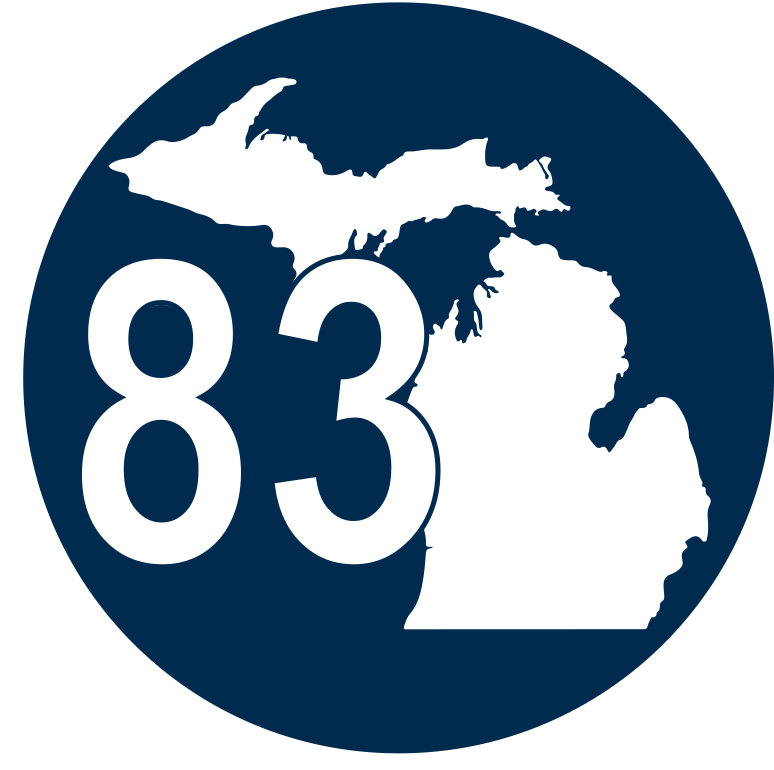 With the Legislature generally out of Lansing since May, MAC’s Podcast 83 team used the summer to present a variety of special episodes on key topics before county government.
With the Legislature generally out of Lansing since May, MAC’s Podcast 83 team used the summer to present a variety of special episodes on key topics before county government.
If you missed them when first released, fear not, you can view them 24/7 at MAC’s YouTube channel:
- Septic Code legislation with guest Rep. Phil Skaggs (D-Kent County)
- Materials management changes
- Revenue Sharing Trust Fund efforts
- Needed changes in Chapter 22 of the state’s Drain Code
- Juvenile justice reform work
Expect to see regular Podcast 83 episodes resume in mid-September as the Legislature returns to Lansing for its fall meeting days.
And if you have a suggestion for a future episode topic or guest, let us know via email to melot@micounties.org.
Transportation asset conference set for Sept. 26
 Registration is now open for the 2023 TAMC Asset Management Conference, to be held Sept. 26, 2023, in Grand Rapids.
Registration is now open for the 2023 TAMC Asset Management Conference, to be held Sept. 26, 2023, in Grand Rapids.
The conference is sponsored by the state’s Transportation Asset Management Council. Kelly Jones of Ingham County is the MAC representative on that panel, which reports to the Michigan Infrastructure Council and the State Transportation Commission.
Among topics to be discussed at the conference are:
- Tips & Recommendations on How to Build a Quality Chip Seal
- Michigan Infrastructure Council Update
- National State of Practice on Local Asset Management
- 2022 PASER Data Analysis and Update
Check out the full agenda. Note: The room block of $85 per night at the DoubleTree hotel expires on Sept. 5. You can book your room(s) online or by calling 616-957-0100; mention that you are booking your room as part of the Asset Management Conference (group code: XMG).
Registration fee is $65 per person and all sessions are in-person only. Deadline to register is Sept. 17.
MAC offices closed for Labor Day

Murray Local No. 2 float in Labor Day parade in Detroit in 1942. (Photo: Library of Congress)
MAC’s Lansing offices will be closed on Monday, Sept. 4 to observe the federal holiday on Labor Day.
Normal office hours will resume on Tuesday, Sept. 5 at 8 a.m.
“In 1894 President Grover Cleveland created Labor Day by signing federal legislation declaring the first Monday in September a national holiday,” notes the Walther Reuther Library in Detroit. “Yet the origins of Labor Day predate his action by many years. As the number of trade unions grew in America during the mid- to late-19th century, their members began to hold periodic parades, rallies, picnics and other events to demonstrate the talents and accomplishments of American workers.
“For more than 100 years, Michiganians have participated in Labor Day parades and other celebrations. One of the first Michigan labor parades took place on July 4, 1865, when more than 4,000 union members — on their way to a picnic —marched down Detroit’s Woodward Avenue, carrying banners, tools and other symbols of their trades. By the turn of the 20th century, similar demonstrations were held in urban centers across the state.”
Annual Conference: Platforms now on website for member review
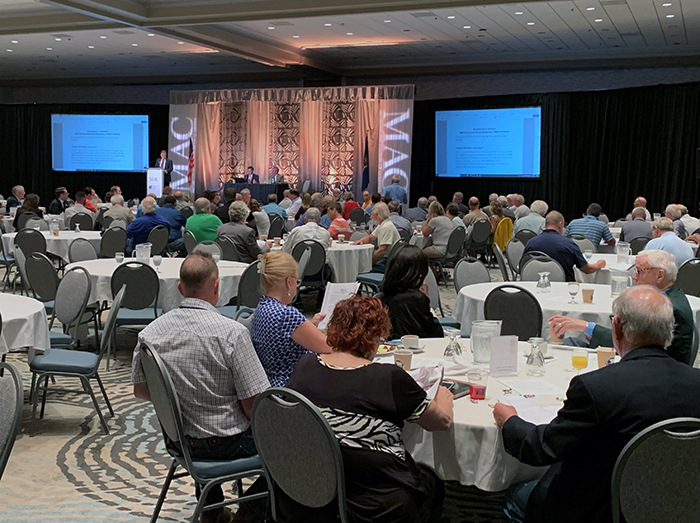
MAC members review and vote on policy platforms at the 2019 Annual Conference.
On Oct. 3 at the 2023 Annual Conference, commissioners in attendance will assemble for the Annual Business Meeting to review and approve policy platforms that govern MAC’s advocacy work in Lansing and Washington, D.C.
Draft versions of those platforms, approved by the MAC Board of Directors earlier in August, are now available on the MAC website. Access to this part of the website is password-protected, but all county board offices have access credentials. Check with them for your county’s credentials if you do not already have them.
According to the by-laws, MAC members may offer amendments in two ways:
- Submit an amendment to the MAC offices at least five (5) days prior to the opening day of the MAC Annual Conference (or Sept. 26 this year); or
- Submit an amendment from the floor during the Annual Business Meeting on Oct. 3.
Please note that amendments submitted in advance require a majority vote on the floor for approval, while amendments submitted on the floor during the session require a 2/3 vote of members attending.
For any questions on the platforms, contact Deena Bosworth at bosworth@micounties.org.
To submit an amendment, email the finished text to despins@micounties.org.
Registration continues for the 2023 Michigan Counties Annual Conference to celebrate MAC’s 125th Anniversary.
For details on pricing, hotel and more sessions, please click here.
For questions about MAC events, contact Tammi Connell at connell@micounties.org.
Whitmer energy plan will reduce local control, MAC has learned
 A renewable energy plan to be announced by Gov. Gretchen Whitmer next week could prove detrimental to local governments, MAC has learned.
A renewable energy plan to be announced by Gov. Gretchen Whitmer next week could prove detrimental to local governments, MAC has learned.
Whitmer will be making an announcement on energy as part of an Aug. 30 event to share her top legislative priorities for the fall. MAC anticipates legislation will be introduced shortly after her address granting all authority for solar and wind development siting to the state, stripping local control over such questions.
The plan, MAC has learned, would let the Michigan Public Service Commission work directly with electric utilities and independent developers to determine the location and size of solar and wind farms. It will likely mirror previous attempts by the Legislature to preempt local control over aggregate mining operations.
MAC opposes any plan that eliminates local control and places the regulating authority in the hands of the state. A more detailed analysis of Whitmer’s proposal, plus a digital advocacy campaign, will be developed once the legislation is introduced.
For more information on this issue, contact Madeline Fata at fata@micounties.org.
Clarifying the upcoming changes in Child Care Fund reimbursement rates
 The FY24 state budget includes $31.5 million to implement a recommendation from the Task Force on Juvenile Justice Reform to statutorily increase the state Child Care Fund reimbursement rate from 50 percent to 75 percent for community-based juvenile justice services. This budget takes effect on Oct. 1, 2023.
The FY24 state budget includes $31.5 million to implement a recommendation from the Task Force on Juvenile Justice Reform to statutorily increase the state Child Care Fund reimbursement rate from 50 percent to 75 percent for community-based juvenile justice services. This budget takes effect on Oct. 1, 2023.
Currently, the reimbursement rate for residential placements and community-based services is at 50 percent. Beginning in FY24, community-based services will be reimbursed at 75 percent. However, residential services will remain at the 50 percent reimbursement rate.
As one of the recommendations from the Task Force on Juvenile Justice Reform, the intent of a 75 percent reimbursement rate for community-based services is to incentivize jurisdictions to utilize community-based services in lieu of incarceration.
In addition to the changes to the Child Care Fund in the FY24 budget, legislation has been introduced to implement the recommendations from the Task Force on Juvenile Justice Reform. House Bill 4624, by Rep. Christine Morse (D-Kalamazoo), would codify the increase to 75 percent reimbursement for community-based services, along with requiring the use of evidence-based practices, risk and assessment screening tools and more.
The requirements outlined in HB 4624, however, will NOT be mandated until the bill is signed by the governor – implementation is likely in FY25. This package is currently awaiting additional testimony in the House Criminal Justice Committee, and MAC anticipates action on these bills this fall. The changes to the Child Care Fund requiring the use of research-based practices and risk and needs assessments can increase system consistency, improve equity and in other states have led to reduced use of incarceration and cost savings.
But again, as of Oct. 1, 2023, the 75 percent reimbursement rate will apply only to community-based services. Residential placement expenses will continue to be reimbursed at 50 percent.
For more information on this issue, contact Samantha Gibson at gibson@micounties.org.
Podcast 83 talks with backer of septic code legislation
 Rep. Phil Skaggs, D-Kent and a former Kent County commissioner, is the guest in a special episode of Podcast 83 focused on regulation of septic systems.
Rep. Phil Skaggs, D-Kent and a former Kent County commissioner, is the guest in a special episode of Podcast 83 focused on regulation of septic systems.
Skaggs is the lead sponsor of House Bill 4479, which is part of a legislative package to institute a statewide septic code, a topic of great controversy in many counties.
Among points made by Skaggs during the discussion:
- Septic issue has been “discussed in Lansing for decades”
- Septic pollution is “serious problem” in many communities, with “15 percent to 25 percent” of septic systems are failing
- Introduced bill to “help start a discussion”
- Need regular inspections because so-called “point of sale” inspections “don’t work”
HBs 4479–80, by Skaggs (D-Kent) and Rep. Carrie Rheingans (D-Washtenaw) respectively, and Senate Bills 299–300, by Sen. Sam Singh (D-Ingham), would require homeowners with onsite wastewater treatment systems to have them inspected every five years.
As of 2020, about 30 percent of state households relied on septic systems, but many are aging and facing failure. The intent of the legislation is to protect waterways from contamination and combat illness caused by increased levels of E. coli and algae blooms. While Michigan remains the only state in the nation without a statewide septic code, the proposed policy changes may be overly burdensome.
A few county boards already have adopted resolutions in opposition to such legislation. MAC has not yet taken a position on the package, but it is participating in a workgroup analyzing the issue.
View the full video of the episode, recorded on July 25, by clicking here.
Previous episodes can be seen at MAC’s YouTube Channel.
And you always can find details about Podcast 83 on the MAC website.
Federal legislation shared on PFAS regulation; court knocks down state controls
 Federal legislation to codify regulation of PFAS was shared recently with stakeholders, including the National Association of Counties (NACo).
Federal legislation to codify regulation of PFAS was shared recently with stakeholders, including the National Association of Counties (NACo).
PFAS, a toxic “forever” chemical linked to a variety of human ailments and used in fire suppression foam, among other substances, is the target of a bipartisan proposal by U.S. Sens. Tom Carper (D-Delaware) and Shelley Moore Capito (R-West Virginia). The intent is to codify the Environmental Protection Agency’s (EPA) rules for safe drinking water standards, incentivize industry leaders to develop innovative technologies to identify PFAS and destroy it and outline best practices for these chemicals. It also would amend the Safe Drinking Water Act State Response to Contaminants program to allow states to assist well owners and authorize a new emergency response program for vulnerable communities.
As owners, users and regulators of water resources, counties are directly impacted by federal regulation regarding PFAS. NACo is seeking inclusion of language to provide local governments with liability protection under the Comprehensive Environmental Response, Compensation, and Liability Act (CERCLA), otherwise known as Superfund. This protection would eliminate the financial burden counties would face when tasked with cleaning up PFAS. NACo supports a polluter pay model to deal with PFAS cleanup.
The need for legislation was reinforced this week in Michigan when the state Court of Appeals invalidated a Department of Environment, Great Lakes and Energy (EGLE) bid to set limits on PFAS levels in drinking water via administrative rules. In knocking down the effort, the stated EGLE did not consider the cost for the industry to comply with the new standards.
For more information on this issue, contact Madeline Fata at fata@micounties.org.
 Staff picks
Staff picks
Conference session to focus on workplace strategies in challenging times

Jeff Butler
With counties continuing to confront hiring, retention and workforce challenges across numerous specialties, the first plenary session of the 2023 Annual Conference (Oct. 1-3 in Kalamazoo County) will feature an expert strategist on “Building an Effective Multi-generational Workplace.”
“The modern-day workplace has four generations working under one roof: Baby Boomers, Generation Xers, Millennials and now Generation Z. All work together to accomplish common organizational goals, however, with differences in each of these generation’s viewpoints, upbringings, culture, ideas, beliefs and experiences, it is likely to see some tiffs or clashes within the organization. Hence, it makes managing four different generations in the workplace an extremely difficult task to accomplish, though not impossible,” says Jeff Butler, speaker and author. “With the right guidance, support and advice, the task of managing these four generations under one roof is achievable. The support may come in various forms, one of which is this program.”
Backed by a decade of psychological research, Butler will share insights about the motivations, differences and communication styles of these four generations. Attendees will learn how organizations across various industries are thriving with a multigenerational workforce and how yours can too. Through this program, you’ll find specific actionable strategies to manage your cross-generational challenges and turn your multigenerational workforce into a competitive advantage.
Registration continues for the 2023 Michigan Counties Annual Conference to celebrate MAC’s 125th Anniversary.
For details on pricing, hotel and more sessions, please click here.
For questions about MAC events, contact Tammi Connell at connell@micounties.org.
Utility takes step toward possible sale of its 13 inland dams
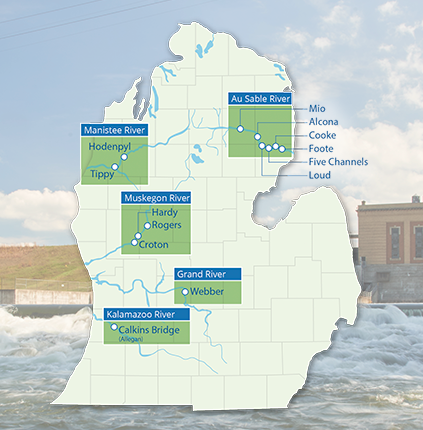 The future ownership and operation of 13 dams owned by Consumers Energy (CE), a major topic of concern for Allegan, Newaygo and other counties, could be determined by the results of an RFP issued by the utility.
The future ownership and operation of 13 dams owned by Consumers Energy (CE), a major topic of concern for Allegan, Newaygo and other counties, could be determined by the results of an RFP issued by the utility.
Consumers’ 13 hydroelectric dams have federal licenses that are set to expire in 2034, so CE has spent the last several months exploring options, including renewing the licenses or selling the dams. The dams are costly to maintain and generate little energy but are responsible for preserving many of Michigan’s rivers and inland lakes. CE hosted a community tour last year where many residents and local leaders voiced their desire for the dams to remain in place.
CE has commissioned an economic impact study using a neutral third party, which was directly requested by a group of county commissioners. The results of that study are expected to be revealed in the coming weeks, and a second round of community tour visits has been planned, a list of which can be found here. The RFP is not a guarantee that the dams will be sold. It is simply another step in CE’s consideration of all possibilities moving forward.
MAC will continue to provide updates as they become available.
For more information on this issue, contact Madeline Fata at fata@micounties.org.
NACo analyzes Treasury rule on ARP funding
 County leaders are encouraged to consult a new analysis from the National Association of Counties (NACo) on the Interim Final Rule (IFR) for the bipartisan State, Local, Tribal, and Territorial Fiscal Recovery, Infrastructure, and Disaster Relief Flexibility Act (i.e. Cornyn/Padilla Amendment).
County leaders are encouraged to consult a new analysis from the National Association of Counties (NACo) on the Interim Final Rule (IFR) for the bipartisan State, Local, Tribal, and Territorial Fiscal Recovery, Infrastructure, and Disaster Relief Flexibility Act (i.e. Cornyn/Padilla Amendment).
This provides counties with the flexibility to invest the $65.1 billion that was allocated under the American Rescue Plan Act’s (ARPA) State and Local Fiscal Recovery Fund (SLFRF) in transportation and infrastructure, disaster relief and community development.
“NACo successfully advocated for the inclusion of the Cornyn/Padilla amendment in the Fiscal Year 2023 Omnibus Package. Included below is an overview of the newly eligible uses under the IFR and how counties can use this new flexibility to support our residents and communities,” the analysis states.
Among key highlights are:
- The IFR provides counties with additional flexibility to invest the American Rescue Plan Act’s (ARPA) State and Local Fiscal Recovery Funds (SLFRF) in transportation and infrastructure projects, disaster relief and Community Development Block Grant (CDBG) program projects.
- The IFR does NOT alter existing eligible uses for SLFRF as outlined under the 2022 Final Rule.
- Counties may use ARPA funds for these newly eligible uses for costs incurred beginning Dec. 29, 2022.
- Counties may use funds for mitigation activities to lessen or avert the threat of a natural disaster and its potential physical or negative economic impacts.
- Counties must still obligate funds, including newly eligible activities, by Dec. 31, 2024.
- Counties must expend ARPA funds obligated to provide emergency relief from natural disasters by Dec. 31, 2026.
To read the full NACo analysis, click here.
NACo academy offers new class for leadership graduates
 The NACo High Performance Leadership Academy is now offering a special class to county leaders that have graduated from their initial training courses.
The NACo High Performance Leadership Academy is now offering a special class to county leaders that have graduated from their initial training courses.
“Leading on Purpose” (for graduates only) is an eight-week course that comes with a special fee of $500 for the first 500 participants. Intentionally designed from scientific evidence and proven practices of great leaders, “Leading on Purpose” will help existing and emerging leaders alike reappraise any longstanding purpose or uncover one for the first time with the use of self-assessments, interactive exercises, online and real-time peer discussions, cohort- based webinars and self-reflection.
The program runs from Oct. 16 to Dec. 15, 2023, and is for graduates of either the NACo High Performance Leadership Academy or the NACo Cybersecurity Leadership Academy.
To enroll in this new program, prior HLPA or Cybersecurity graduates can email Luke Afeman at lukea@pdaleadership.com or Tarver Hannant at tarverh@pdaleadership.com.
S taff picks
taff picks
Board approves 2023-24 platforms for final member review

The MAC Board of Directors reviews policy platforms during its summer meeting on Aug. 9, 2023.
The MAC Board of Directors, at its summer meeting, reviewed the association’s policy platform drafts for 2023-24 and approved them for final review by the membership at the 2023 Annual Conference.
MAC’s advocacy work is guided by these policy platforms, which are developed through meetings of MAC’s six policy committees each year:
- Agriculture and Tourism
- Environmental and Natural Resources
- Finance and General Government
- Health and Human Services
- Judiciary and Public Safety
- Transportation and Infrastructure
The next step in this annual process will begin on Friday, Aug. 25 when the policy drafts post to the MAC website for member review. According to the by-laws, MAC members may offer amendments in two ways:
- Submit an amendment to the MAC offices at least five (5) days prior to the opening day of the MAC Annual Conference (or Sept. 26 this year); or
- Submit an amendment from the floor during the Annual Business Meeting on Oct. 3.
Please note that amendments submitted in advance require a majority vote on the floor for approval, while amendments submitted on the floor during the session require a 2/3 vote of members attending.
For any questions on the platforms, contact Deena Bosworth at bosworth@micounties.org.
To submit an amendment, email the finished text to despins@micounties.org.
Podcast 83 episode focuses on 2023 Annual Conference details
 Details about the 2023 Annual Conference in Kalamazoo County are the focus of a special episode of Podcast 83, MAC’s podcast about all things related to Michigan’s 83 counties.
Details about the 2023 Annual Conference in Kalamazoo County are the focus of a special episode of Podcast 83, MAC’s podcast about all things related to Michigan’s 83 counties.
Guest Tammi Connell, MAC’s director of member events, provides a rundown of the conference mechanics, including the timeline for registration, when to show up at the conference venue, the Radisson Hotel in downtown Kalamazoo, and even what music you can expect to hear at the Gala following the traditional President’s Banquet on the night of Monday, Oct. 2.
Deena Bosworth, MAC’s director of governmental affairs, provides more conference details, including on this event’s workshops for county leaders, including a special two-day dive into the exceedingly complicated – and important – road funding formula found in Public Act 51.
View the full video of the episode, recorded on July 28, by clicking here.
For additional details on the Annual Conference, click here.
Previous episodes can be seen at MAC’s YouTube Channel.
And you always can find details about Podcast 83 on the MAC website.
MAC creates resolution template for Overdose Awareness Day and National Recovery Month
 August and September highlight a time to recognize the lives lost to drug overdose and celebrate recovery from substance use disorders. Overdose Awareness Day is recognized internationally on Aug. 31 annually to raise awareness of drug overdose, stigma associated with overdose deaths and acknowledge grief experienced by families and friends remembering those lost and injured as a result of drug overdose. To find out more information, you can visit https://www.overdoseday.com/.
August and September highlight a time to recognize the lives lost to drug overdose and celebrate recovery from substance use disorders. Overdose Awareness Day is recognized internationally on Aug. 31 annually to raise awareness of drug overdose, stigma associated with overdose deaths and acknowledge grief experienced by families and friends remembering those lost and injured as a result of drug overdose. To find out more information, you can visit https://www.overdoseday.com/.
Recovery Month is recognized nationally throughout the month of September to promote new evidence-based treatment and recovery practices, the strength and resilience of the recovery community and highlight the providers and communities that support recovery from substance use disorders. To find out more information, visit https://www.samhsa.gov/recovery-month.
MAC has created a template overdose awareness day and recovery month proclamation which counties can customize to highlight their commitment to addressing stigma and overdose, honoring the lives lost, celebrating those in recovery and sharing that recovery is possible.
For more information on MAC’s services regarding the opioid crisis, contact Amy Dolinky at dolinky@micounties.org.
Fees and fines are focus of next ‘Fiscally Ready’ webinar
 “Nuts and Bolts: Fees, Fines, Purchasing and Receipting” is the theme for the next “Fiscally Ready Communities” webinar hosted by the Michigan Department of Treasury and Michigan State University Extension.
“Nuts and Bolts: Fees, Fines, Purchasing and Receipting” is the theme for the next “Fiscally Ready Communities” webinar hosted by the Michigan Department of Treasury and Michigan State University Extension.
Registration is now open for this free webinar series, which is offered on these dates:
- Aug. 17, 2 p.m. to 3:30 p.m. ET
- Sept. 11, 6 p.m. to 7:30 p.m. ET
- Oct. 11, 1:30 p.m. to 3 p.m. ET
- Nov. 7, 10 a.m. to 11:30 a.m. ET
The training is designed to assist appointed and elected officials.
This webinar will include a deep dive into best practices related to fees, fines, purchasing, receipting, and more. It will cover what they are, why such policies are necessary, how they contribute to local fiscal health, and how to get started on implementation.
For more information, contact Eric Walcott at walcott3@msu.edu.
Transportation asset conference set for Sept. 26
 Registration is now open for the 2023 TAMC Asset Management Conference, to be held Sept. 26, 2023, in Grand Rapids.
Registration is now open for the 2023 TAMC Asset Management Conference, to be held Sept. 26, 2023, in Grand Rapids.
The conference is sponsored by the state’s Transportation Asset Management Council. Kelly Jones of Ingham County is the MAC representative on that panel, which reports to the Michigan Infrastructure Council and the State Transportation Commission.
Among topics to be discussed at the conference are:
- Tips & Recommendations on How to Build a Quality Chip Seal
- Michigan Infrastructure Council Update
- National State of Practice on Local Asset Management
- 2022 PASER Data Analysis and Update
Check out the full agenda.
Registration fee is $65 per person and all sessions are in-person only. Deadline to register is Sept. 17.
 Staff picks
Staff picks
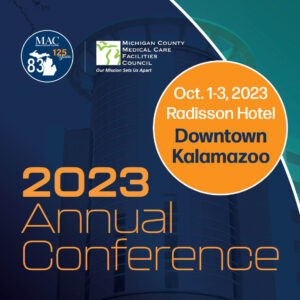 County leaders wishing to attend the 2023 Annual Conference, Oct. 1-3 in Kalamazoo County, have until 5 p.m. today (Sept. 8) to utilize the early-bird price of $415 for members.
County leaders wishing to attend the 2023 Annual Conference, Oct. 1-3 in Kalamazoo County, have until 5 p.m. today (Sept. 8) to utilize the early-bird price of $415 for members. Macomb County would get a new probate judge and Kent County a new district judge under legislation reviewed this week by the House Judiciary Committee.
Macomb County would get a new probate judge and Kent County a new district judge under legislation reviewed this week by the House Judiciary Committee. Two new documents have been released to assist counties around the opioid settlements. MAC helped create the documents in collaboration with the Opioid Advisory Commission; the Michigan Departments of Attorney General, Civil Rights, Corrections and Treasury; and the Michigan Municipal League and Michigan Townships Association.
Two new documents have been released to assist counties around the opioid settlements. MAC helped create the documents in collaboration with the Opioid Advisory Commission; the Michigan Departments of Attorney General, Civil Rights, Corrections and Treasury; and the Michigan Municipal League and Michigan Townships Association. Staff picks
Staff picks

 As the summer driving season winds down, no Michigan resident, or public leader, needs to be reminded of the state’s ongoing infrastructure challenges.
As the summer driving season winds down, no Michigan resident, or public leader, needs to be reminded of the state’s ongoing infrastructure challenges. With the Legislature generally out of Lansing since May, MAC’s Podcast 83 team used the summer to present a variety of special episodes on key topics before county government.
With the Legislature generally out of Lansing since May, MAC’s Podcast 83 team used the summer to present a variety of special episodes on key topics before county government. Registration is now open for
Registration is now open for 

 A renewable energy plan to be announced by Gov. Gretchen Whitmer next week could prove detrimental to local governments, MAC has learned.
A renewable energy plan to be announced by Gov. Gretchen Whitmer next week could prove detrimental to local governments, MAC has learned. The FY24 state budget includes $31.5 million to implement a recommendation from the Task Force on Juvenile Justice Reform to statutorily increase the state Child Care Fund reimbursement rate from 50 percent to 75 percent for community-based juvenile justice services. This budget takes effect on Oct. 1, 2023.
The FY24 state budget includes $31.5 million to implement a recommendation from the Task Force on Juvenile Justice Reform to statutorily increase the state Child Care Fund reimbursement rate from 50 percent to 75 percent for community-based juvenile justice services. This budget takes effect on Oct. 1, 2023. Rep. Phil Skaggs, D-Kent and a former Kent County commissioner, is the guest in
Rep. Phil Skaggs, D-Kent and a former Kent County commissioner, is the guest in  Federal legislation to codify regulation of PFAS was shared recently with stakeholders, including the National Association of Counties (NACo).
Federal legislation to codify regulation of PFAS was shared recently with stakeholders, including the National Association of Counties (NACo).
 The future ownership and operation of 13 dams owned by Consumers Energy (CE), a major topic of concern for Allegan, Newaygo and other counties, could be determined by the results of an RFP issued by the utility.
The future ownership and operation of 13 dams owned by Consumers Energy (CE), a major topic of concern for Allegan, Newaygo and other counties, could be determined by the results of an RFP issued by the utility. County leaders are encouraged to consult a new analysis from the National Association of Counties (NACo) on the Interim Final Rule (IFR) for the bipartisan
County leaders are encouraged to consult a new analysis from the National Association of Counties (NACo) on the Interim Final Rule (IFR) for the bipartisan  The NACo High Performance Leadership Academy is now offering a special class to county leaders that have graduated from their initial training courses.
The NACo High Performance Leadership Academy is now offering a special class to county leaders that have graduated from their initial training courses.
 Details about the 2023 Annual Conference in Kalamazoo County are the focus of
Details about the 2023 Annual Conference in Kalamazoo County are the focus of  August and September highlight a time to recognize the lives lost to drug overdose and celebrate recovery from substance use disorders. Overdose Awareness Day is recognized internationally on Aug. 31 annually to raise awareness of drug overdose, stigma associated with overdose deaths and acknowledge grief experienced by families and friends remembering those lost and injured as a result of drug overdose. To find out more information, you can visit
August and September highlight a time to recognize the lives lost to drug overdose and celebrate recovery from substance use disorders. Overdose Awareness Day is recognized internationally on Aug. 31 annually to raise awareness of drug overdose, stigma associated with overdose deaths and acknowledge grief experienced by families and friends remembering those lost and injured as a result of drug overdose. To find out more information, you can visit  “Nuts and Bolts: Fees, Fines, Purchasing and Receipting” is the theme for the next “
“Nuts and Bolts: Fees, Fines, Purchasing and Receipting” is the theme for the next “ Registration is now open for
Registration is now open for 





